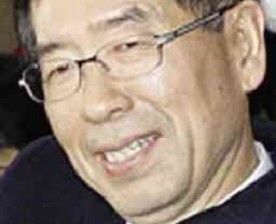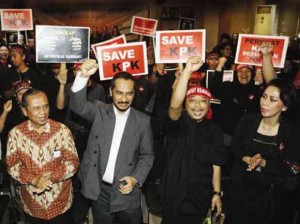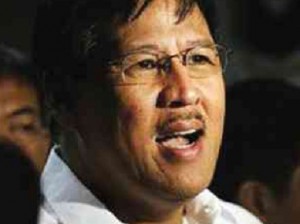How corruption can be curbed
The country has been reeling from a barrage of sordid tales of how the pork barrel scam was carried out. The unfolding details reveal a massive web of corruption that has scandalized even those who thought they have heard everything.
The stink has reached the highest offices of the land and the citizens are mad. But all is not lost. By some fortunate coincidence, two recent visitors to the country brought glimmers of hope.
Two Ramon Magsaysay Awardees, one previous and one current, were in Manila and shared how they battled to contain corruption in their respective countries. And in celebrating his first death anniversary last month, we revisit the anticorruption legacy of another Magsaysay awardee, highly esteemed as the public’s true servant.
They have shown that corruption does not have to become our way of life and that we need to take bold, strategic and steadfast steps in the long journey to ethical governance.
Championing transparency, participatory governance
Park Won Soon
“Mildew grows in damp places. Corruption prospers under the umbrella of secrecy. Disclose everything and all will be clean.”
A courageous social activist who ran against the powerful political establishment and became mayor of Seoul, the world’s third largest megalopolis, Park Won Soon strives to advance South Korea’s democracy by expanding the power of its citizens.
Before his election, Park spent 30 years of his life as a social justice and human rights activist dating to the 1970s when participation in protest actions landed him in jail. Persevering, he became a human rights lawyer and threw himself headlong into South Korea’s emerging democracy movement.
In 1994, he founded the nonprofit, nonpartisan civic organization People’s Solidarity for Participatory Democracy (PSPD) that monitored government regulatory practices, and fought government corruption and abuses in the corporate sector.
Citizens’ vigilance
PSPD worked for the passage of the Act on the Prevention of Corruption, calling for better government accountability. Its proposed reforms included a system for whistle-blower protection, measures to prevent money laundering, stiffer penalties for the corrupt, and the creation of a strong and independent investigative body.
To push for the law’s adoption, PSPD launched a signature drive, collaborated with media and other organizations, lobbied officials, conducted public forums and engaged in pressure politics through sit-ins and demonstrations.
Under Park’s leadership, the PSPD collected information about the performance of some 2,000 parliamentarians, justices and other high government officials. The information helped citizens make an enlightened assessment, for example, during elections.
In 2000, PSPD mounted a controversial blacklist campaign, naming 86 candidates “unfit to run” for seats in parliament. Fifty-nine of them were rejected by voters.
PSPD also demonstrated that it was willing to work in constructive partnership with government and the business sector. It forged an integrity pact with the Seoul government, a joint government-civil society partnership to combat corruption.
The pact provided for an ombudsman system that monitors government contracts (from bidding to project management), whistle-blower protection and other forms of citizen participation. This system of partnership against corruption eventually expanded across other administrative bodies.
‘Naked project,’ big ear
When Park took office as mayor of Seoul, he acted to make his administration especially transparent. He decided to disclose every piece of information about the city administration, be it a document, a database or a meeting.
He believed that transparency was the core of any anticorruption drive, serving as a country’s barometer of its level of development as a civilization. “I intend to make Seoul the most transparent city in the world,” he declared.
The city established a system to ensure that construction work was completed as planned, false reporting was prevented and shoddy construction work did not occur. Pursuing full transparency, more than 1,000 sealed documents were disclosed to the public. The mayor called it “the naked project.”
Mayor Park also launched a citizen-participatory budget plan that allowed citizens to secure 50 billion won (roughly $47 million) in 2013 for projects of their choosing, as well as participate in planning, allocating and executing the city budget of 21 trillion won ($18 billion).
The city set up listening workshops where citizens could make suggestions that were considered in drafting policies. A large ear greeted those who entered city hall, which the mayor renamed Citizens’ Hall, where people could freely air their complaints or suggestions, which were then recorded and transmitted to appropriate offices for action.
UN recognition
The policies of the Seoul Metropolitan Government were selected winners of the UN Public Service Awards (UNPSA) for 2013. The city’s welfare criteria (in the people’s participation promotion sector) won the grand award, while the anticorruption administrative system won the excellence award.
First adopted in 2003, the UNPSA has emerged as the most authoritative award in the public administration sector.
Park was honored with the Ramon Magsaysay Award for public service in 2006 for his principled activism, and for fostering social justice, clean government and a generous spirit in South Korea’s young democracy.
Cleaning house in Indonesia
Corruption Eradication Commission
Corruption is a formidable opponent and to expunge it from a culture that has embraced it as a norm is a daunting order. Indonesia has been consistently listed by Transparency International as one of the most corrupt countries in the world. Corruption in the country has become so endemic that it affected everyone, from the village level all the way to the center of power in Jakarta.
Designed to succeed
Since the 1950s, all government attempts to create institutions tasked with fighting corruption went for naught. The breakthrough came when the law creating the Komisi Pemberantasan Korupsi (KPK), or the Corruption Eradication Commission, was passed in 2002.
The KPK mandate includes investigating and prosecuting corruption cases and monitoring the governance of the state. It can authorize wiretaps, impose travel bans, request financial information about suspects, freeze financial transactions and request the assistance of other law enforcement agencies.
It also has the authority to detain suspects, including well-known figures, and frequently does so.
KPK relied on the media, NGOs and civil society protection during crises and attacks from opposition. It also ensured that its internal code of ethics was as strong as the ethical standards it applied to corruptors.
Conviction rate
In 10 years of operation, KPK handled 332 cases involving top government officials. Of these, 169 cases have been processed in court, with all the cases resulting in convictions. The commission has returned to the state treasury recovered assets worth more than $80 million.
KPK has tightened rules on wealth reporting by public officials, removed opportunities for corruption in government operations and introduced “integrity zones” in the bureaucracy as a way of grading government performance.
For the Indonesian public, anticorruption education has been introduced at all educational levels and innovative campaigns have been undertaken to create a culture of honesty among citizens.
President’s in-law jailed
In 2008, KPK sentenced the former governor of the Bank of Indonesia to five years in prison for embezzling $10.3 million of central bank funds. This led to the arrest of the bank’s former deputy governor, the father-in-law of President Yudhoyono’s son, who was imprisoned for four and a half years in 2009. Bank officers had approved the disbursement of Rp100 billion ($10 million), money used for the legal expense of former officials implicated in graft cases, for political settlements and for accelerating the House of Representatives’ amendment to the Bank of Indonesia Law.
One of the strengths of KPK is the thoroughness of its investigators and prosecutors in gathering solid evidence before they go to the courts. The KPK law also mandates that once it starts an official investigation, the case has to be brought to court. This was meant as a remedy against the dubious overuse by law enforcement agencies of temporary restraining orders to halt investigations.
Ex-lawmaker charged with bribery, laundering
Wa Ode Nurhayati, a former member of the House budget committee, took a Rp5.5-billion (about $500,000) bribe from a businessman to get three districts in Aceh included in a lucrative infrastructure program in 2011.
She received another Rp750 million to get a district in North Sulawesi included in the same program. Ode tried to erase all traces of the bribes by carrying out transfers between her various bank accounts and buying several assets, but KPK’s case against her was airtight.
In October 2012, the Jakarta Corruption Court sentenced her to six years in prison for her crimes.
Beyond probe, prevention
KPK is committed to develop long-term preventive and educational measures, and the parallel reforms of key institutions such as the bureaucracy, judiciary and police that will prevent corrupt practices from becoming entrenched.
The Ramon Magsaysay Award received by KPK in 2013 is in recognition of its fiercely independent and successful campaign against corruption that combined the prosecution of erring powerful officials with farsighted reforms in governance systems.
Handing power to the people
Jesse Robredo
“Unless and until the citizens claim good governance from those who vow to serve them, we will not [succeed in] the work of participatory governance.”
As mayor of Naga City, Jesse Robredo is best-remembered for his passion for people empowerment and his strong anticorruption focus, which fueled an ambitious reform program that transformed the city into an island of good governance.
After a resurgent Naga reclaimed its first-class city status, Robredo was reelected without opposition in 1995. He then urged the Naga City Council to enact a unique empowerment ordinance and with it, a People’s Council, to institutionalize the participation of NGOs and people’s organizations in all future municipal deliberations.
Consequently, Naga City won international awards for local governance excellence in a range of areas, including improvements in the environment, participatory planning, women-friendly development, poverty reduction, e-governance, procurement and fiscal prudence.
Robredo carried his pursuit of transparency to the national stage when he was appointed head of the Department of the Interior and Local Government. He instituted a full-disclosure policy (FDP) that requires local governments to reveal in public places 12 key financial documents that showed how funds were spent.
As of June 2012, 1,697 or 99 percent of local government units (LGUs) had complied with the policy.
Full compliance with the FDP is a requirement for the conferment of the seal of good housekeeping, which Robredo started when he was still mayor, rewarding honesty and excellence in key governance areas. It is awarded to LGUs every year.
“The seal of good housekeeping is a performance-based incentives system that aims to weave into the very foundation of our society two values. That of transparency and accountability all the way down to the barangays. It will transform LGUs to become bukas, matino at mahusay as defined by how they serve the people,” Robredo said.
LGUs that pass the assessment on good housekeeping qualify for the Performance Challenge Fund (PCF), another governance innovation of Robredo as interior and local government secretary. The PCF is a financial incentive awarded to qualified LGUs to jump-start local development initiatives aligned with the national government’s programs for the attainment of the Millennium Development Goals and other priority needs.
Robredo called on local officials to strive for the seal of good housekeeping as a tenet of good governance and urged them to use the PCF to finance development projects, such as school buildings, water and sanitation systems, local roads and bridges, flood control and reforestation.
As of June 2012, 856 LGUs that qualified for the award had been granted P1.1 billion—money that, based on the guidelines, was allocated for the poorest of the poor.
Robredo believed that measuring outcomes would lead to improvement. He enhanced the Local Governance Performance Management System by turning it into an assessment tool validated by third-party evaluation. Consolidated results show that there has been a consistent increase in the number of LGUs with high overall performance ratings, from 913 in 2009 to 1,261 in 2011.
There has also been a 200-percent leap in the number of LGUs that now allow civil society organizations, public organizations, the academe and religious groups to participate in local governance.
After he met his untimely death last year, the Movement for Good Governance said it was crucial that the reforms Robredo had begun be continued and that his replacement make sure that the ideals he fought for are protected.
Robredo demonstrated that “effective city management was compatible with yielding power to the people,” as noted by the Ramon Magsaysay Award Foundation which recognized him as its awardee for government service in 2000.
The editors of the Philippine Daily Inquirer voted Robredo as the Filipino of the Year for 2012.




















